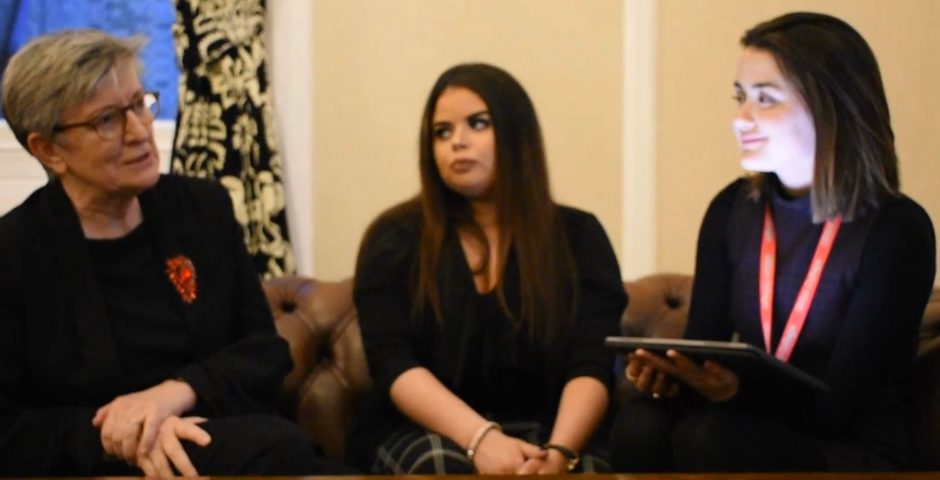
The Tab meets domestic abuse campaigners
1,958,000 people in the UK are affected every year
In late January, The Tab Cambridge was lucky enough to talk to the panellists who came to the Cambridge Union to speak about domestic violence.
Each of the women on the panel was affable and evidently passionate about the work that they do. All three are prominent in their tireless campaigning to improve the conditions for victims of domestic violence.
Elizabeth Woodcraft is a leading campaigner surrounding issues of domestic violence and in her professional capacity as a barrister played an instrumental role in shaping the Domestic Violence Bill of 1976. Lyndsey Dearlove is the head of UK Says No More, a national campaign launched to raise awareness of domestic violence and sexual assault across the UK.
Perhaps most impressive, however, is Ainie Granger, who despite being just 21 years old, has overcome childhood domestic abuse and managed to make a significant name for herself through her work campaigning on issues related to domestic violence in her home country of Ireland.
Ainie recognises a clear sense of disconnect that many people feel towards the victims of domestic violence, saying "it is something that you don't really know anything about and don't understand." However, it is blatantly a vital topic and the effects of domestic and childhood abuse, which affects one in five people, can be devastating.
There is a clear correlation between childhood abuse and an increased risk of poorer physical and mental health as well as worse social, educational and criminal justice outcomes. Ainie admits she became engaged in two unhealthy relationships in the past; however, she considers herself lucky and has benefitted considerably from counselling and play therapy, although she does sadly acknowledge that for many "the waiting list can be so long. "
While domestic abuse appears to many as an upsetting but ultimately distant issue, it is essential to remember that around 10 per cent of 16 to 19-year-old women are affected. Lyndsey sees this as particularly significant and believes that the prevalence makes it all the more important for people to be provided with the correct training, so they are equipped to appropriately respond if someone close to them is affected. As she astutely points out, "university students very quickly make incredibly close friends who become their family. They likely would be the first people you turn to."
However, this kind of understanding is evidently lacking, even in professions where it would be expected or desirable for practitioners to have a sense of awareness. As Elizabeth notes, there has been a definite cut back in judges training, something she considers "madness" since she believes vital funding has been diverted when "we should be improving support "for victims.
This distinct lack of understanding also extends to the treatment that many male victims of domestic abuse experience. While there are around 685,000 male victims of domestic violence per year in the UK, it is still an issue which is rarely spoken of. Elizabeth believes that to an extent this can be attributed to the fact that for many men "it can actually be more difficult for them to admit the experience."
Lyndsey elaborates on this point by explaining that often the help is just not there "there are a few refuges [for men] but none in London, for example." They do not, however, believe that this state of affairs will continue for long. Lyndsey instead recognises that "relationships are chasing quite rapidly so in the next five to 10 years working with men will be slightly different than what it is like now."
With modern relationships evolving at such an expeditious pace, it seems intriguing to consider how new forms of media have fed into these developments.
When asked what she thought of the increasingly pervasive narrative in fiction and films aimed at young girls that portrays domestic abuse as a game that keeps the relationship exciting and passionate, Ainie asserted her belief that the media has "such a negative effect."
Elaborating, she also makes clear that we should be mindful of the ways social media allows abusive partners to further monitor and control their spouse, a criticism that appears particularly reasonable when we consider how platforms such as Snapchat allow users to track their friends' location in real-time.
Lyndsey perhaps deserves the concluding quote through her acknowledgement that while domestic abuse does not end as soon as someone walks out the door, it is down to people like her to ensure that victims are “given people the emotional and practical support to leave.”
For those who have been affected by the issues raised in this article, help is available in a number of places. For support from Women's Aid, click here.









































